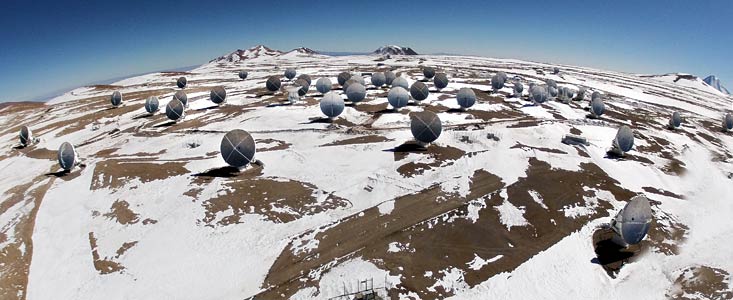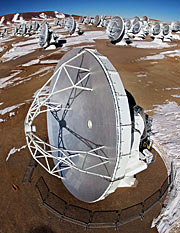Zprávy
Aerial Pictures from ALMA in Operation
31. července 2013
The full magnitude of the ALMA Observatory is revealed in these spectacular new images of the antenna array, surrounded by snow on the Chajnantor Plateau in northern Chile. The images were recently captured using a camera mounted on a hexacopter.
The flight, which is being registered as a Guinness World Record for multi-rotor aircraft at high altitude, was achieved thanks to the remote-controlled aircraft’s lightweight carbon fibre platform. The hexacopter, which has six sets of rotors, also features autonomous functions that assist with navigation and allow the aircraft to return to its point of departure in the event of signal loss.
"Before we arrived at the ALMA site there was no record of such a device flying so high. The low atmospheric pressure means that the lift from the propellers is greatly reduced," states photographer Ariel Marinkovic, who led the photography session.
The only solution was to reduce the hexacopter’s weight by as much as possible. To achieve this, the frame and landing gear were removed, and replaced by a lighter structure, and a tiny camera of just 200 grams was selected, reducing the total weight by 1.2 kilograms.
But there was another challenge: the freezing temperatures (around -3 degrees Celsius at 5000 metres above sea level, where the ALMA antennas are located) could lead the hexacopter to lose up to 70% of its power capacity. To avoid this, a coat made out of thermal fabric and aluminium was installed around its batteries.
"It was a real gamble: the hexacopter was designed to fly about 4500 metres lower than the altitude of the ALMA high site. Calculations suggested that it wouldn’t be possible to take off," recalled Marinkovic. Nonetheless, he felt it was worth a try: "in a previous journey to 4200 metres above sea level, I saw seagulls, and I thought that a bird wouldn’t fly in a place where it needs to use 90% of its energy just to find its next meal."
That reasoning turned out to be correct and images of ALMA were successfully taken.
This event recalled the origin of Chajnantor’s name, which for the Atacameño people — the original inhabitants of the region — meant "Place of Departure".
Kontakty
Richard Hook
ESO, Public Information Officer
Garching bei München, Germany
Tel: +49 89 3200 6655
Cell: +49 151 1537 3591
Email: rhook@eso.org
O zprávě
| Id: | ann13064 |
Our use of Cookies
We use cookies that are essential for accessing our websites and using our services. We also use cookies to analyse, measure and improve our websites’ performance, to enable content sharing via social media and to display media content hosted on third-party platforms.
ESO Cookies Policy
The European Organisation for Astronomical Research in the Southern Hemisphere (ESO) is the pre-eminent intergovernmental science and technology organisation in astronomy. It carries out an ambitious programme focused on the design, construction and operation of powerful ground-based observing facilities for astronomy.
This Cookies Policy is intended to provide clarity by outlining the cookies used on the ESO public websites, their functions, the options you have for controlling them, and the ways you can contact us for additional details.
What are cookies?
Cookies are small pieces of data stored on your device by websites you visit. They serve various purposes, such as remembering login credentials and preferences and enhance your browsing experience.
Categories of cookies we use
Essential cookies (always active): These cookies are strictly necessary for the proper functioning of our website. Without these cookies, the website cannot operate correctly, and certain services, such as logging in or accessing secure areas, may not be available; because they are essential for the website’s operation, they cannot be disabled.
Functional Cookies: These cookies enhance your browsing experience by enabling additional features and personalization, such as remembering your preferences and settings. While not strictly necessary for the website to function, they improve usability and convenience; these cookies are only placed if you provide your consent.
Analytics cookies: These cookies collect information about how visitors interact with our website, such as which pages are visited most often and how users navigate the site. This data helps us improve website performance, optimize content, and enhance the user experience; these cookies are only placed if you provide your consent. We use the following analytics cookies.
Matomo Cookies:
This website uses Matomo (formerly Piwik), an open source software which enables the statistical analysis of website visits. Matomo uses cookies (text files) which are saved on your computer and which allow us to analyze how you use our website. The website user information generated by the cookies will only be saved on the servers of our IT Department. We use this information to analyze www.eso.org visits and to prepare reports on website activities. These data will not be disclosed to third parties.
On behalf of ESO, Matomo will use this information for the purpose of evaluating your use of the website, compiling reports on website activity and providing other services relating to website activity and internet usage.
Matomo cookies settings:
Additional Third-party cookies on ESO websites: some of our pages display content from external providers, e.g. YouTube.
Such third-party services are outside of ESO control and may, at any time, change their terms of service, use of cookies, etc.
YouTube: Some videos on the ESO website are embedded from ESO’s official YouTube channel. We have enabled YouTube’s privacy-enhanced mode, meaning that no cookies are set unless the user actively clicks on the video to play it. Additionally, in this mode, YouTube does not store any personally identifiable cookie data for embedded video playbacks. For more details, please refer to YouTube’s embedding videos information page.
Cookies can also be classified based on the following elements.
Regarding the domain, there are:
- First-party cookies, set by the website you are currently visiting. They are stored by the same domain that you are browsing and are used to enhance your experience on that site;
- Third-party cookies, set by a domain other than the one you are currently visiting.
As for their duration, cookies can be:
- Browser-session cookies, which are deleted when the user closes the browser;
- Stored cookies, which stay on the user's device for a predetermined period of time.
How to manage cookies
Cookie settings: You can modify your cookie choices for the ESO webpages at any time by clicking on the link Cookie settings at the bottom of any page.
In your browser: If you wish to delete cookies or instruct your browser to delete or block cookies by default, please visit the help pages of your browser:
Please be aware that if you delete or decline cookies, certain functionalities of our website may be not be available and your browsing experience may be affected.
You can set most browsers to prevent any cookies being placed on your device, but you may then have to manually adjust some preferences every time you visit a site/page. And some services and functionalities may not work properly at all (e.g. profile logging-in, shop check out).
Updates to the ESO Cookies Policy
The ESO Cookies Policy may be subject to future updates, which will be made available on this page.
Additional information
For any queries related to cookies, please contact: pdprATesoDOTorg.
As ESO public webpages are managed by our Department of Communication, your questions will be dealt with the support of the said Department.




